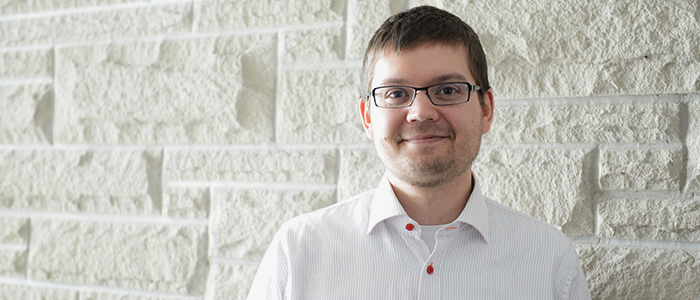Getting in touch with the brain

Have you ever wondered how the brain works to move the hand?
Questions like this have fostered Andrew Pruszynski’s interest in his research that involves how the brain and body interact to create purposeful movement and experience sensation.
One of the Department of Physiology and Pharmacology’s newest faculty members, and a Robarts Scientist, Pruszynski, PhD, is interested in how the brain integrates information from the hand and the arm, particularly related to the sense of touch.
More recently he has been focusing on how a particular class of neurons in the skin can perform some very sophisticated computations about the things that we touch.
“We previously thought these kinds of computations required a lot of processing in the higher levels of the brain,” Pruszynski said. “We are actually showing that they are already started in the first touch neurons in the skin.”
Aside from the basic knowledge that they will gain understanding what kinds of computations these neurons do and how they do them, he said this research would provide a new perspective on how to deal with nerve injury.
While many patients regain some tactile acuity after injuring a peripheral nerve, Pruszynski and his colleagues would like to use their knowledge to come up with ways to get the neurons to regrow in a way that would give them a better outcome.
Pruszynski has always been a very curious person. He explained his wife “goes crazy” because he is continuously asking questions about the things around him. He needs to know how things work and why they do what they do.
“That curiosity I have has been channeled in this particular direction,” he said. “I think I just have this deep-seated need to keep scratching at things until I figure out what is going on.”
Originally from Poland, Pruszynski and his family moved to Canada when he was four years old. After growing up in the Toronto area, he decided to pursue his undergraduate degree in electrical engineering at Simon Fraser University in Vancouver. He then completed a PhD in neuroscience at Queen’s University in Kingston, and moved to Sweden for four years to do a postdoctoral fellowship at Umeå University.
Pruszynski began his new faculty position with Schulich Medicine & Dentistry in December. As someone who is just starting out, he is thankful to have the opportunity to work in a place that is home to many world-class researchers and great infrastructure, including the Robarts Imaging facility.
“In the domain of cognitive and systems neuroscience, this is probably the best place in Canada to work,” he said. “There are a lot of close colleagues doing overlapping or similar research, and a lot of great tools here that we can all share.”
When Pruszynski isn’t working, you can find him spending time with his wife and two children, ages one and four. He is also a huge Formula One fanatic and tries to go to as many races as he can.








